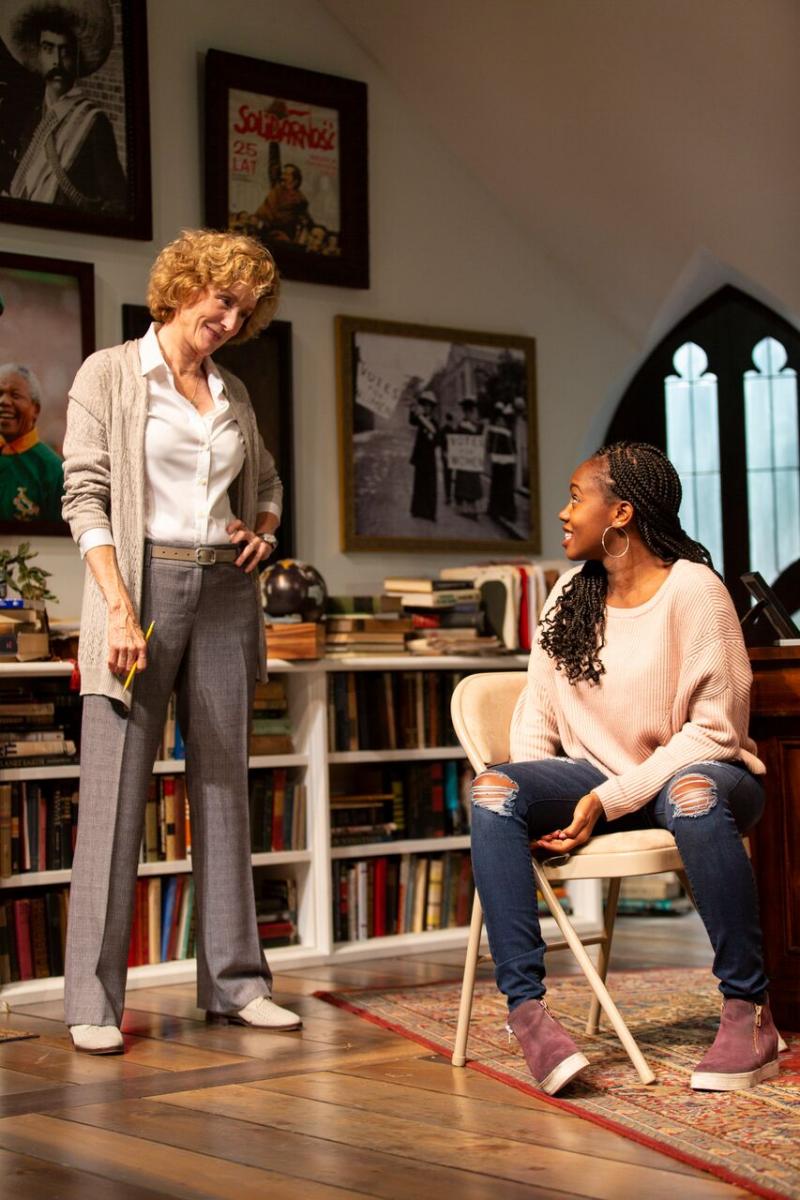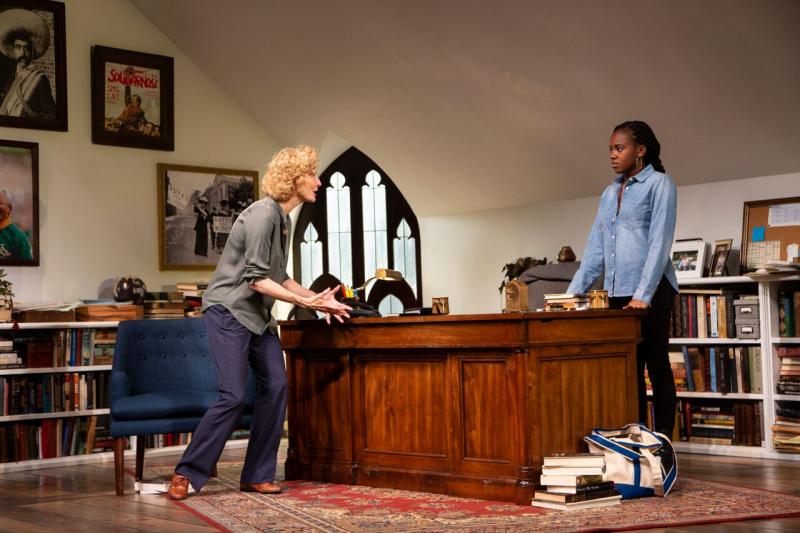Review: Eleanor Burgess' Thought-Provoking THE NICETIES Debates Microaggressions and Revolutions
"You're more afraid of looking like a racist than you are of being a racist," an African-American college student surmises when her white professor reacts with panic when it becomes clear that she intends to go public on social media with the content of the conversation they just had.

(Photo: T. Charles Erickson)
Without naming names, the moment serves as an effective reminder of well-meaning liberals from privileged groups who have faced demands to apologize from liberals of (or defending) marginalized groups when their words are accepted differently from the way they were intended.
In Eleanor Burgess' thought-provoking The Niceties, a private argument between two people goes public, and while one side appears to emerge victorious in the court of public opinion, neither is unscathed.
Mentions of the expected results of the upcoming presidential election firmly set the play in 2016. Twenty-year-old Zoe (Jordan Boatman), a junior at what the author describes as "an elite northeastern college" nervously sits on the metal folding chair provided for her in the office of Janine (Lisa Banes) a history professor in her early 60s.
Seated in a more comfortable piece of office furniture behind her antique mahogany desk, at first Janine offers tips to give Zoe's paper for her Comparative Revolutions course "more flair."
Then comes the news that sets the play in motion. Janine insists that Zoe must do major rewrites because the argument for her paper, "A successful American Revolution was only possible because of the existence of slavery," is fundamentally unsound.
This surprises Zoe because she got the idea from Janine's lecture on how most revolutions come in two phases. Examples such as in France and China show how there's an initial revolution led by the upper-middle class making moderate constitutional changes that protect their own self-interests, which tends to be followed by a more radical revolution by the poor and marginalized because the first revolution made no changes to help their situation.
Zoe's paper argues that the American Revolution was successful because the poorest, most marginalized people on the continent, the ones who would have organized the more radical revolution, were kept in chains as slaves.
While Janine admires her theory as "bold, original thinking," she points out the lack of primary documentation from the people who were there. Zoe counters that slaves weren't allowed to learn how to read and write, and that she's unlikely to find diary entries from the Founding Fathers saying things like, "June tenth. Today I used racism to bond with the other delegates."
Though Janine insists that history is traditionally regarded as a story told by documented evidence, Zoe points out that setting such limits excludes those who were suppressed from stating their views from having a voice in history.

(Photo: T. Charles Erickson)
As their conversation branches out into other subjects, the differences between them become more heated as the student points out what she sees as microaggressions in the professor's behavior, such as her disapproval to Zoe's participation in a cross-cultural alliance that is protesting an on-campus speaking engagement by Supreme Court Justice Sandra Day O'Connor.
"You're protesting the first female supreme court justice?"
"In 41 decisions involving racial minorities, O'Connor voted against the minority all but two times."
When Zoe points out that Janine mispronounces the names of several minority students and may not have everyone's pronoun preference right, the professor says that nobody has corrected her. Zoe explains that those students are in vulnerable positions may feel uncomfortable making such requests, and that it's the responsibility of those more privileged to extend the offer.
By the end of the first act it becomes apparent that their conflict parallels the previously discussed phases of revolution. Janine represents the upper middle class first phase whose fight for equality resulted in moderate constitutional changes. Zoe represents the radical revolution of the poor and marginalized, insisting that their rights are not coming fast enough.
The second act presents a follow-up meeting between the two, and Janine has a much more comfortable chair waiting for her guest.
Directed by Kimberly Senior, both actors give persuasive performances, with Boatman's Zoe seeming intimidated at first, but switching firmly into activist leadership mode when she perceives her rights as being flippantly disregarded. Though Janine is sometimes scripted as being too condescending and too oblivious to the privilege her skin color grants her, and is on occasion staged with oddly broad reactions, Banes does a fine job of showing the character's struggle to retain her composure when her belief in racial equality is challenged.
While Black Lives Matter and #MeToo are never mentioned (the latter existed, but wasn't nationally popularized at the time the play takes place), their success in forcing white people supporting the Civil Rights Movement and men supporting the Feminist Movement and to consider their own transgressive behaviors do come to mind. Perhaps history books of the future will regard them as the organized beginnings of a long-delayed second phase.
Reader Reviews


